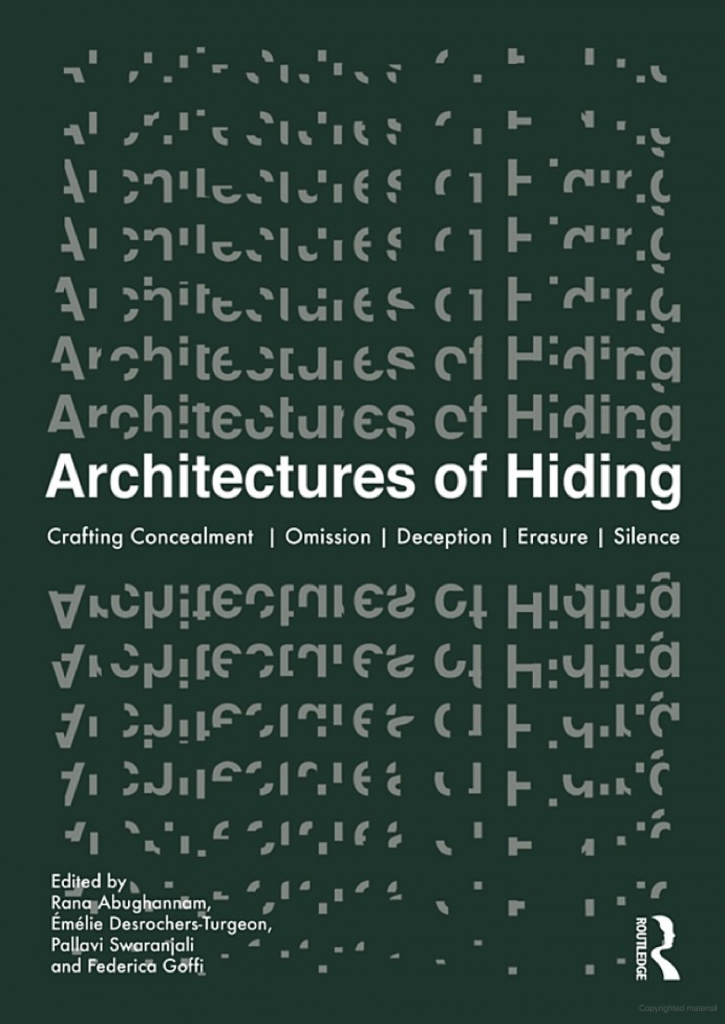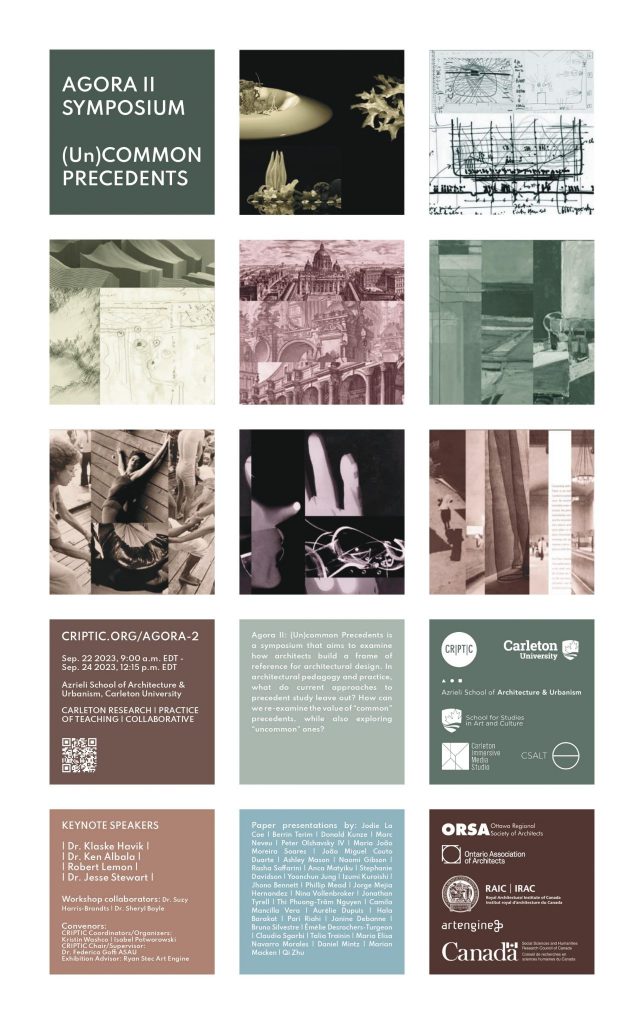New book, Architectures of Hiding -Routledge 2024
Architectures of Hiding: Crafting Concealment | Omission | Deception | Erasure | Silence
Edited by Rana Abughannam, Émélie Desrochers-Turgeon, Pallavi Swaranjali and Federica Goffi
March 18, 2024

The 320-page book published in January 2024 by Routledge Architecture is now available through the Carleton University’s MacOdrum Library in digital format, and also for purchase as a hardback, paperback, or e-book at Routledge.
Architectures of Hiding considers apparatuses, modes, temporalities, motives, and materiality in the crafting of architecture—whether for the deployment of coercive power, exclusion, erasure, or as techniques of imagination, resistance, safety, or agency.
The publication resulted from the inaugural CriptiCollab symposium AGORA I held at ASAU in September 2021 by ASAU PhD Candidates Rana Abughannam (UBC SALA), Émélie Desrochers- Turgeon (Dalhousie University), ASAU PhD graduate Dr. Pallavi Swaranjali (Algonquin College) and Professor of Architecture Federica Goffi, PhD, co- chair of MAS & PhD Program in architecture at the ASAU, CU.
About Architectures of Hiding: Crafting Concealment | Omission | Deception | Erasure | Silence
Architecture manifests as a space of concealment and unconcealment, lethe and alêtheia, enclosure and disclosure, where its making and agency are both hidden and revealed. With an urgency to amplify narratives that are overlooked, silenced and unacknowledged in and by architectural spaces, histories and theories, this book contends the need for a critical study of hiding in the context of architectural processes. It urges the understanding of inherent opportunities, power structures and covert strategies, whether socio-cultural, geo-political, environmental or economic, as they are related to their hidescapes – the constructed landscapes of our built environments participating in the architectures of hiding.
Looking at and beyond the intentions and agency that architects possess, architectural spaces lend themselves as apparatuses for various forms of hiding and un(hiding). The examples explored in this book and the creative works presented in the interviews enclosed in the interludes of this publication cover a broad range of geographic and cultural contexts, discursively disclosing hidden aspects of architectural meaning. The book investigates the imaginative intrigue of concealing and revealing in design processes, along with moral responsibilities and ethical dilemmas inherent in crafting concealment through the making and reception of architecture.
Table of Contents: Thirty-one contributors from fifteen countries bring diverse perspectives to a timely inquiry into the issue of the opacity of truth to explore the making of architecture as a social, political, and physical construct that conceals as much as it reveals.
The volume is divided in three parts: Part 1: Modes of Hiding: Veiled Devices Beyond the Gaze; Part 2: Motives of Hiding: Disguised Narratives; Part 3: Concealed Apparatus: Latencies and Potentialities in Material Realities. The contributors are:
MONICA EILEEN PATTERSON | BERTRAND ROUGIER | FRANÇOIS SABOURIN | RYAN STEC | PALLAVI SWARANJALI | JODI LA COE | MARCIA FEUERSTEIN | JENAN GHAZAL | MENNA AGHA | KYVELI MAVROKORDOPOULOU | RAMON RISPOLI | DORA VANETTE | SAMIRA DANESHVAR | HEATHER LEIER | ELIYAHU KELLER | YING ZHOU | ANWAR JABER | ASHLEY MASON | PAUL EMMONS | REBECCA WILLIAMSON | CLAUDIO SGARBI | ZENOVIA TOLOUDI | LOUISE PELLETIER | STEFAAN VERVOORT | TEMINIOLUWA THOMAS | JEFFREY KRUTH | ALLISON SCHIFANI | KRISTIN WASHCO | LINDA HEINRICH | HALA BARAKAT | DON KUNZE
Critic Reviews
“This volume performs a masterful reveal of architecture’s masked motives and methods. Its elegant structure presents remarkably rich and diverse insights into architecture’s invisible agencies.”
Leslie Van Duzer, Professor of Architecture, University of British Columbia
“The editors have assembled a wide-ranging cast of scholars to account for the unaccounted. Aggregating terms with a family resemblance to the gerund ‘hiding’ – from camouflage to clutter, violence to veils – the authors discuss how buildings and builders actively occlude their own political, physical, and cultural orders. Interested in post-truth history and criticism of the built world? Then this is a book for you.”
David Theodore, Associate Professor, McGill University
“At a time of greater enforcement of data protection principles for the personal information of individuals, this invaluable book delves into an essential topic: understanding the dynamics, the imaginative possibilities, the moral dilemmas and ethical responsibilities of concealment and revealment in architecture, its histories, theories, power structures, and overlooked narratives.”
Sophia Psarra, Professor of Architecture and Spatial Design, Bartlett School of Architecture, UCL

FORTHCOMING: A book based on the 2023 symposium (Un)Common Precedents, is now under contract with Routledge Architecture and is forthcoming in 2025.
The three-day international symposium was convened by Dr. Federica Goffi, co-chair of the MAS & PhD program in architecture, and PhD candidates Isabel Potworowski, and Kristin Washco from September 22 to 24, 2023 at the Azrieli School of Architecture & Urbanism at Carleton University.
About Carleton Research | Practice of Teaching | Collaborative
C R | P T | Collaborative | is formed by PhD candidates, PhD students, post-professional master’s students, and faculty of the Azrieli School of Architecture & Urbanism at Carleton University. The collaborative, founded in 2019, pursues research in the humanities with a diverse research agenda that reflects the interests of the collaborators through the practice of teaching in academic settings in architecture.
C R | P T | C activities | are collaborative in nature and include research, publications, symposia, and exhibits.
C R | P T | C works | transmediate between the written word and epistemic constructions.
About the PhD in Architecture
The PhD in Architecture program at the Azrieli School of Architecture & Urbanism is an innovative, comprehensive doctoral program that fuses research with critical practice in architecture through the combined exploration of a dissertation and an epistemic object, which is uniquely defined in relation to the research.
The program’s exceptionally talented and thoughtful students undertake original, speculative, and experimental research. Doctoral projects draw on the interrelated reflective aspects of architecture, design, and material processes. The PhD students explore a range of media that support their investigations, including film, drawing, modeling, and mapping.
The PhD rigorously prepares graduates for academic and professional fields.
The PhD Program in Architecture helps form reflective practitioners and critical thinkers who will contribute to both practice and academia, challenging current and dominant understandings of architecture practice and pedagogy and contributing to the renewal of architectural knowledge.